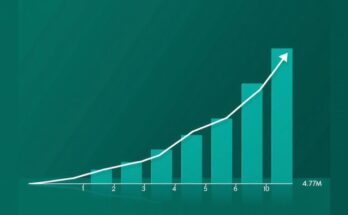The 2025 Budget presents an ambitious economic agenda to reset Ghana’s economy facing significant challenges including high public debt and fiscal risks in energy and cocoa sectors. It emphasizes strategic reforms aimed at sustainable growth, realistic growth targets, revenue mobilization, expenditure rationalization, and a transformative Big Push Infrastructure Programme. This budget aims to restore fiscal credibility and ensure a prosperous future for all Ghanaians.
The 2025 Budget Statement outlines an ambitious economic agenda aimed at revitalizing Ghana’s economy following challenges inherited from the prior administration. The nation faces significant economic hurdles, including a substantial public debt, fiscal risks in vital sectors such as energy and cocoa, and deficiencies in public financial management. This budget intends to address these urgent concerns through strategic reforms that promote sustainable and inclusive growth.
Acknowledging the severe economic realities inherited, particularly the public debt peak in 2022, the 2025 Budget Statement notes that Ghana has lost access to international capital markets. Consequently, the government has engaged in a debt exchange program and received liquidity support from the IMF. Ghana’s debt challenges are widespread, yet the nation’s position remains critical, with considerable debt servicing obligations of GHS150.3 billion for domestic debt and US$8.7 billion for external debt projected from 2025 to 2028.
To mitigate these challenges, the government proposes various measures such as operationalizing a sinking fund, restructuring existing debt, and cautiously reopening the domestic bond market. Such actions are essential to alleviate liquidity strains, particularly related to short-term treasury bill obligations totaling GH¢111.1 billion in 2025.
The budget identifies substantial fiscal risks within the energy and cocoa sectors, both crucial to Ghana’s economy. The energy sector is constrained by a legacy debt of about US$1.73 billion owed to Independent Power Producers (IPPs) and a projected GH¢35 billion financing gap for 2025. Additionally, the cocoa sector has experienced nearly a 50% decline in production over the last three years, further intensifying fiscal pressures.
To address these issues, the government plans to renegotiate contracts with IPPs to lower capacity charges, enhance revenue collection via private sector involvement, and adjust cocoa farmgate prices to mitigate smuggling. These initiatives aim to reduce the fiscal burden posed by these critical sectors on the national budget.
Setting realistic growth targets is a central feature of the 2025 Budget. Despite achieving a 5.7% GDP growth in 2024, much of this was attributed to increased gold production, some linked to illegal mining and smuggling, resulting in a US$5 billion loss in potential revenue. For 2025, the government projects real GDP growth at 4.00% and non-oil GDP growth at 4.80%, representing a more sustainable acknowledgement of structural challenges facing the economy.
Revenue mobilization remains a vital element of the government’s fiscal strategy, with proposed tax reforms such as streamlining the VAT system and removing the COVID-19 levy. Furthermore, the government plans to increase the Growth & Sustainability Levy from 1% to 3%. Concerning expenditures, rationalization entails the discontinuation of programs like the Ghana CARES (Obaatanpa) and One District, One Factory (1D1F), translating to over GH¢1.8 billion in savings.
A noteworthy aspect of the budget includes uncapping statutory funds, which will generate over GH¢20 billion in fiscal space for priority projects including the Big Push Infrastructure Programme and the Agriculture for Economic Transformation (AETA) initiative. This uncapping seeks to enhance funding for infrastructure development and agricultural transformation, both essential for the nation’s economic progress.
One of the most significant aspects of the 2025 Budget is the Big Push Infrastructure Programme, aimed at expediting the country’s infrastructure development. This initiative seeks to make strategic investments in transport, energy, and technology to tackle existing infrastructure bottlenecks that have hindered economic productivity. The program aligns with similar efforts globally, such as the UK’s Levelling Up initiative, and is intended to propel sustainable economic growth and job creation.
In conclusion, the 2025 Budget represents a bold response to Ghana’s economic challenges. Grounded in realism, it acknowledges current constraints while pursuing recovery and long-term growth. By setting conservative growth targets, emphasizing fiscal discipline, and applying strategic revenue reforms, the budget demonstrates a mature understanding of Ghana’s economic landscape. The ambitious Big Push Infrastructure Programme positions Ghana as a proactive nation, recognizing infrastructure’s role in economic transformation. This budget serves as a comprehensive roadmap for restoring fiscal credibility and fostering inclusive growth, ultimately aiming for a prosperous future for all Ghanaians.
The 2025 Budget serves as a comprehensive and strategic response to the economic hardships faced by Ghana. By setting considered growth targets and focusing on fiscal discipline and revenue reforms, the budget lays a pathway for recovery and long-term sustainability. The Big Push Infrastructure Programme is particularly noteworthy, showcasing a commitment to infrastructure development as a vehicle for economic transformation. Overall, this budget is a robust framework aimed at fostering inclusive growth and a prosperous future for Ghana’s citizens.
Original Source: www.ghanaweb.com




